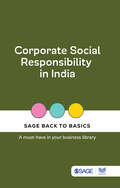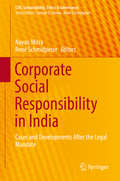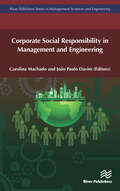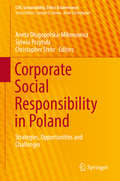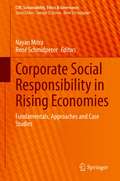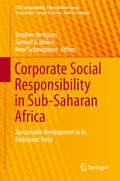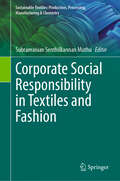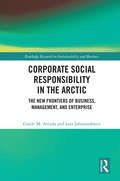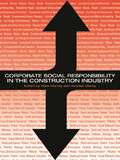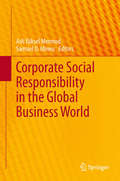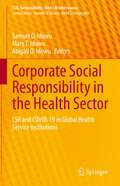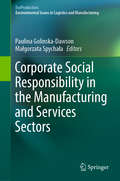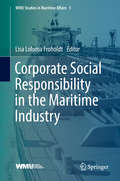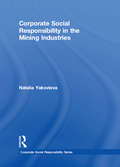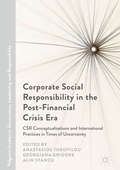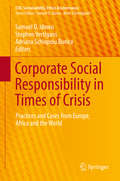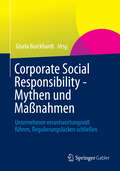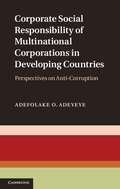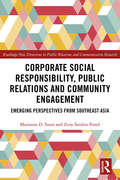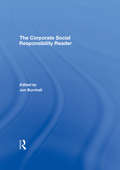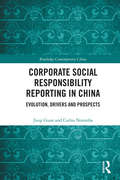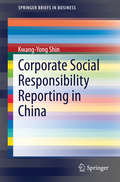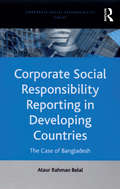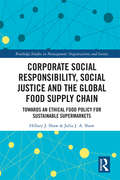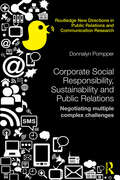- Table View
- List View
Corporate Social Responsibility in India (SAGE Back to Basics)
by SAGE Publications India Pvt. LtdBlending theory with practical application, Corporate Social Responsibility in India provides an overview of the CSR field, defining CSR and placing it in the context of a wider corporate strategy. It talks about CSR issues related to the organization and provides case studies on well-known firms. Adopting a stakeholder perspective, this book explores CSR issues within the complex business environment in which corporations operate today. SAGE Back to Basics is a distilled compilation of proven and timeless ideas and best practices for new-age and experienced leaders alike. The hand-picked collection of books—on management, leadership, entrepreneurship, branding and CSR—offer advice from management experts whose knowledge and research has impacted and shaped business and management education. Other books in the series:: Timeless Leadership | Advertising and Branding Basics | Leadership Lessons from Dr Pritam Singh | Basics of Entrepreneurship | Human Resource Development Insights | Ideate, Brainstorm, Create | Building Professional | Timeless Management | Soft Skills for Workplace Success
Corporate Social Responsibility in India: Cases and Developments After the Legal Mandate (CSR, Sustainability, Ethics & Governance)
by René Schmidpeter Nayan MitraThis book provides a comprehensive overview of Corporate Social Responsibility (CSR) in Indian corporations following the 2013 legal mandate on corporate spending of profits for CSR. Bringing together authors hailing from diverse walks of life, the book pursues a 'hands-on' approach, with real-world case studies and examples that help the reader feel the dynamic pulse of India immediately after the ratification of the CSR mandate in the Companies Act, 2013. The Act is expected to affect over 16,300 companies with an estimated flow of approximately 200 billion Indian rupees into the economy every year, thus shaking the foundations of business and society and impacting the country at multiple stakeholder levels. As a result, India is likely to become the birthplace of social, economic, and environmental transformation through financial investments in CSR! In order to insightfully reflect on this transition, this book has been divided into three parts. The first part presents the CSR mandate and its implications, while the second focuses on its implementation and the third part provides a view on the way forward. The book helps to reveal the various layers of CSR in an emerging economy like India and is expected to spark debate, discussion and research among policy-makers, consultants, academics, practitioners and other stakeholders the world over, which will further expand its contribution to CSR literature and open up new vistas in CSR research. "This is indeed a first of its kind book and marks a watershed in the journey of CSR. It is an extremely important contribution to the body of knowledge in the area of CSR and Corporate Goverance in emerging economies that is driven by a completely different set of challenges, opportunities and requirements from that of developed economies. " Dr. Bhaskar Chatterjee, Director General & CEO, Indian Institute of Corporate Affairs
Corporate Social Responsibility in Management and Engineering
by Carolina Machado; João Paulo DavimReferring to an organizations responsibility for their impact on society, corporate social responsibility (CSR) is greatly relevant for the competitiveness, sustainability and innovation in the management and engineering arena of organizations, and the economy worldwide. Taking in account its these concerns, Corporate Social Responsibility in Management and Engineering covers the issues related to corporate social responsibility in management and engineering in a context where organizations are facing, day after day, high challenges for what concerns issues related to their social responsibility. The book looks to contribute to the exchange of experiences and perspectives about the state of the research related to CSR, as well as the future direction of this field of research. It looks to provide a support to academics and researchers, as well as those that operating in the management field need to deal with policies and strategies related to CSR.
Corporate Social Responsibility in Poland: Strategies, Opportunities and Challenges (CSR, Sustainability, Ethics & Governance)
by Christopher Stehr Aneta Długopolska-Mikonowicz Sylwia PrzytułaThis book examines the development and adoption of corporate social responsibility (CSR) in Polish businesses and social and environmental organizations, and analyzes the corresponding impact at the strategic and operational level in these fields. It presents the status quo of CSR in Poland from three main perspectives: The first presents theoretical works based on current research and recent advances, while the next takes a closer look at empirical findings in the different fields of CSR (e.g. finance, reporting, law) and presents best practices from major international companies operating on the Polish market. Lastly, it presents a range of case studies from small and medium companies and NGOs in Poland and gives an outlook on the future development.Readers will benefit from an in-depth discussion of the opportunities and challenges that businesses and organizations in Poland are currently facing with regard to traditional national values and the influx of new cultural and social dimensions and patterns produced by international businesses entering the Polish market. Taken together, the lessons learned, case studies and snapshots of the latest developments provide a comprehensive overview of the state of the art of CSR in Poland, as well as a blueprint that can be applied to other Eastern European countries.
Corporate Social Responsibility in Rising Economies: Fundamentals, Approaches and Case Studies (CSR, Sustainability, Ethics & Governance)
by Nayan Mitra René SchmidpeterEmerging economies arguably have different socio-fiscal dynamics compared to developed economies. On one side they have the need for corporate interventions in national development, on the other hand, they do not have enough research to support the agenda. In recent times there has been a conscious effort to legislate Corporate Social Responsibility (CSR) in some of these countries in order to bring about sustainable development. Yet, it is this legislation, which is debated among many others.This book provides its readers with a comprehensive interpretation of the various CSR perspectives in emerging economies through academic research and case studies from practice. It not only points out the challenges, the debates, but also the dynamics of implementation and the impact of such CSR spent. This book therefore is targeted both towards academics as well as practitioners in an attempt to bring about an active academic-industry interface as CSR as a management function is part of dynamic social science.
Corporate Social Responsibility in Sub-Saharan Africa: Sustainable Development in its Embryonic Form (CSR, Sustainability, Ethics & Governance)
by Samuel O. Idowu Stephen Vertigans René SchmidpeterThis book provides a comprehensive overview of corporate social responsibility and its development in Africa. It provides in-depth studies on 11 sub-Saharan countries, demonstrating that corporate social responsibility is forming and going through different stages of metamorphosis in the continent. Though corporate and individual attitudes towards sustainability in Africa still leave a lot to be desired, this book showcases how things are rapidly changing for the better in this regard. It demonstrates and provides evidence for the fact that corporate social responsibility contributes significantly to the way sub-Saharan African economies are being transformed, with service sectors expanding, commercial activities diversifying and industrial bases growing through the initiatives of small, medium and large organizations and innovators supported by widespread higher-education program rollouts. The book highlights how progressive and wide-ranging CSR approaches have emerged, and how much they differ from the obsolete approaches of the past, which promulgated negative stereotypes, marginalized communities and positioned them as victims or beneficiaries of development.
Corporate Social Responsibility in Textiles and Fashion (Sustainable Textiles: Production, Processing, Manufacturing & Chemistry)
by Subramanian Senthilkannan MuthuThis contributed volume provides a wealth of case studies on corporate social responsibility in the textile and fashion industry. The cases presented here are geographically diverse and cover a host of topics ranging from sustainability aspects of slow fashion to how fast fashion can become more sustainable. The fashion and textile supply chain is discussed, as well as how tools such as life cycle assessment can contribute to a more responsible textile industry. This book highlights how being a responsible corporate citizen can contribute to a firm's bottom line as well as make its products more attractive to conscientious consumers.
Corporate Social Responsibility in the Arctic: The New Frontiers of Business, Management, and Enterprise (Routledge Research in Sustainability and Business)
by Gisele M. Arruda Lara JohannsdottirCorporate Social Responsibility in the Arctic considers the new trends and frontiers of Corporate Social Responsibility (CSR) studies that are shaping the future of global business strategy and ethics. This book systematically approaches the CSR framework of internal and external factors and their impact on the social responsibility of businesses within the sensitive environment of the Arctic. It presents traditional and contemporary models of CSR through case studies of the eight Arctic nations and explores the debates concerning social responsibility and ethical dilemmas related to social and environmental aspects of business operations, society, and ecosystems. Arruda and Johannsdottir also review approaches for engaging stakeholders in social responsibility, socio-environmental standards, and sustainability, according to frameworks like the UN Sustainable Development Goals, the UN Global Compact, the OECD Guidelines for Multinational Enterprises and the Global Reporting Initiative, but also according to the new CSR strategy in the Arctic based on circular economy, blue economy, smart specialization, knowledge-intensive entrepreneurship, and new parameters of education. Overall, this book examines the ways in which the changing climate and rich natural resources of the Arctic provide unique opportunities and challenges for businesses and societies. This book will be of great interest to students and scholars of CSR, sustainable business, and business ethics.
Corporate Social Responsibility in the Construction Industry
by Mike Murray Andrew DaintyThe construction process, right through from planning and design to use and demolition, has a major impact on society. Traditionally, concern has been focused on its environmental impact and the quest for sustainability, but this has now extended into the wider remit of Corporate Social Responsibility (CSR). Essentially, this means that businesses must act (voluntarily) in a socially ethical manner by developing a policy that encompasses the core principles enshrined by CSR. A unique presentation on a topic of emerging importance, Corporate Social Responsibility in the Construction Industry is essential reading for all built environment undergraduate and post-graduate courses, as well as CEOs and senior managers within construction businesses who may be about to embark on developing a CSR strategy.
Corporate Social Responsibility in the Global Business World (CSR, Sustainability, Ethics & Governance)
by Samuel O Idowu Asli Yüksel MermodThis book provides an overview of the application of Corporate Social Responsibility in businesses and corporations around the world. Primarily based on real cases, it focuses on different approaches to CSR from a global perspective. It provides a critique of the "wrong" practices often employed even by multinational organizations, and highlights the resultant negative effects. On the other hand the book demonstrates good examples that can help multinationals or even entire countries to achieve both a better reputation and increased profitability. "CSR in the Global Business World" is a rich resource of illustrative cases, serving both as a basis for ongoing research as well as for teaching purposes at the business school level.
Corporate Social Responsibility in the Health Sector: CSR and COVID-19 in Global Health Service Institutions (CSR, Sustainability, Ethics & Governance)
by Samuel O. Idowu Mary T. Idowu Abigail O. IdowuThe pandemic that struck in late 2019 - the coronavirus, commonly referred to as COVID-19 - affected every country in the world. This book examines how the pandemic has impacted healthcare institutions worldwide, and focuses on the international experience of COVID-19 in terms of healthcare delivery since 2019 and today. It highlights how healthcare facilities around the world have managed and continue to manage their obligations to their citizens. The book’s goal is to improve our understanding of the many negative and positive impacts of the pandemic on various aspects of our lives, including the health aspect, and how healthcare institutions could expand their ability to manage similar pandemics in the future without seriously compromising their ability to address other, regular health issues. At the same time, it takes a closer look at CSR, sustainability, ethics, and governance issues related to the pandemic, as well as current CSR practices in each of the countries reviewed.Given its scope, the book will be of interest to a broad readership including researchers, practitioners, and students concerned with the pandemic’s societal and public health implications.
Corporate Social Responsibility in the Manufacturing and Services Sectors (EcoProduction)
by Paulina Golinska-Dawson Małgorzata SpychałaCorporate Social Responsibility (CSR) is an important element in creating competitive advantages for enterprises in different sectors. The authors guide readers through the different cases studies in order to present the benchmarking of international standards and CSR initiatives, as well as CSR performance evaluation practices. This book aims to identify current problems that can arise during CSR implementation in manufacturing and services companies. Moreover some best practice examples suitable for the introduction of CSR in the small and medium size companies will be described. The authors show how different stakeholders can benefit from sustainable resource management and pro-social behaviors. This book will be a valuable resource for both academics and practitioners who want to deepen their knowledge of CSR. This scientific monograph has been doubled blind reviewed.
Corporate Social Responsibility in the Maritime Industry (Wmu Studies In Maritime Affairs Ser. #5)
by Lisa Loloma FroholdtThis book addresses the environmental, legal, social, and economic aspects of corporate social responsibility in the maritime industry. It discusses the voluntary aspects of the CSR concept and how the lines between informal and formal rules are merging and becoming fuzzy. Further, it shows how regulation is enhancing responsibility and sustainability in the maritime industry.The book gathers the experiences of the WMU, IMO, UN and public and private actors in developing and developed countries in the maritime industry.
Corporate Social Responsibility in the Mining Industries (Corporate Social Responsibility Series)
by Natalia YakovlevaBased on the concept of corporate social responsibility, this book analyses modern approaches adopted by mining companies that could minimise negative impacts of mining and enhance positive benefits to corporate stakeholders. Using a case study of two mining sectors (gold and diamond mining) the book evaluates policies and practices of mining companies within four key areas of corporate social responsibility: environmental protection, health and safety, employee relations and community development. Also included is an assessment of three models for community development that are developed within the mining industries: company-led approach, establishment of corporate foundation and tri-sector partnership. The study analyses management of corporate social responsibility issues with specific reference to mining in the Russian Federation and provides a comparison with global mining companies.
Corporate Social Responsibility in the Post-Financial Crisis Era: CSR Conceptualisations and International Practices in Times of Uncertainty (Palgrave Studies in Governance, Leadership and Responsibility)
by Anastasios Theofilou Georgiana Grigore Alin StancuBringing together normative and instrumental CSR conceptualizations, practice based examples and international case studies, this edited volume brings together important contributions on the conceptualizations of CSR post financial crisis. Including coverage of a variety of practices in developing and developed contexts, industry-specific activities, business ethics and sustainable development issues, Corporate Social Responsibility in the Post-Financial Crisis brings together a variety of perspectives to provide knowledge and understanding across contexts.
Corporate Social Responsibility in Times of Crisis: Practices and Cases from Europe, Africa and the World (CSR, Sustainability, Ethics & Governance)
by Samuel O. Idowu Stephen Vertigans Adriana Schiopoiu BurleaThis book explores national and transnational companies' Corporate Social Responsibility (CSR) activities in times and settings in which they are confronted with economic and social challenges and analyzes these situations, ranging from the financial crisis to fourth generation sustainability. Presenting a number of different cases from various parts of Europe, North America and Africa, it showcases how companies respond to the challenges of the development, consultation, implementation, integration, measurement and consolidation of CSR. Further it specifies how these corporations deal with uncertainties over corporate and financial resources, global financial stability and growing evidence for climate change. The book describes CSR adaptation under challenging circumstances and argues for the strategic and operative legitimation of Corporate Social Responsibility in times of crisis.
Corporate Social Responsibility - Mythen und Maßnahmen: Unternehmen verantwortungsvoll führen, Regulierungslücken schließen
by Gisela BurckhardtIn Zeiten der Globalisierung und Massenproduktion rückt verantwortungsvolle Unternehmensführung immer mehr in das Bewusstsein der Unternehmen. Damit Corporate Social Responsibility in Organisationen nicht als reine PR-Maßnahme angesehen wird, braucht es jedoch zunächst ein tiefes Verständnis, was sich hinter dem Begriff eigentlich verbirgt. Dieses Buch zeigt die Bandbreite von Unternehmensverantwortung zwischen Freiwilligkeit und Regulierung in globalen Lieferketten auf. Es stellt Maßnahmen und Initiativen von Unternehmen vor und gibt konkrete Empfehlungen, wie sinnvolle und nachhaltige CSR-Maßnahmen in Organisationen umgesetzt werden können.
Corporate Social Responsibility of Multinational Corporations in Developing Countries
by Adefolake O. Adeyeye"The increasing importance of CSR means that companies must consider multi-stakeholder interests as well as the social, political, economic, environmental and developmental impact of their actions. However, the pursuit of profits by multinational corporations has led to a series of questionable corporate actions and the consequences of such practices are particularly evident in developing countries. Adefolake Adeyeye explores how CSR has evolved to aid the anti-corruption campaign. By examining voluntary rules applicable for curbing corruption, particularly bribery and analysing the domestic and extra-territorial laws of Nigeria, United Kingdom and the United States for holding corporations liable for bribery, she assesses the adequacy of international law's approach towards corporate liability for bribery and explores direct corporate responsibility for international corruption. The roles of corporate governance, global governance and civil liability in curbing corporate corrupt practices are given special focus"--"The increasing importance of CSR means that companies must consider multi-stakeholder interests as well as the social, political, economic, environmental and developmental impact of their actions. However, the pursuit of profits by multi-national corporations has led to a series of questionable corporate actions, and the consequences of such practices are particularly evident in developing countries"--
Corporate Social Responsibility, Public Relations and Community Engagement: Emerging Perspectives from South East Asia (Routledge New Directions in PR & Communication Research)
by Marianne D. Sison Zeny Sarabia-PanolDiverse in economic development, political and mass media systems, the countries in Southeast Asia cast a unique light on the parallels between development-cum-participative communication and corporate social responsibility. In our globalized environments, knowledge of power, culture and the colonial histories that influence and shape business and governance practices are increasingly important. Focusing on six countries—Indonesia, Malaysia, the Philippines, Singapore, Thailand and Vietnam—the book discusses how public relations (PR) and corporate social responsibility (CSR) discourse are constructed, interpreted, communicated and enacted in this diverse emerging region. By connecting the disparate disciplines of participatory and development communication with PR and CSR discourse, this innovative text explores the tensions between concepts of modernity and traditional values and their role in engendering creativity, compliance or resistance. This book will be of interest to researchers, educators and advanced students in the fields of public relations, communication, corporate social responsibility, corporate communications and Southeast Asia studies.
The Corporate Social Responsibility Reader
by Jon BurchellIn the age of global capitalism, shareholders, and profits are not the only concerns of modern business corporations. Debates surrounding economic and environmental sustainability, and increasing intense media scrutiny, mean that businesses have to show ethical responsibility to stakeholders beyond the boardroom. A commitment to corporate social responsibility may help the wider community. It could also protect an organization’s brand and reputation.Including key articles and original perspectives from academics, NGOs and companies themselves, The Corporate Social Responsibility Reader is a welcome and insightful introduction to the important issues and themes of this growing field of study. This book addresses:the changing relationships between business, state and civil societythe challenges to business practicewhat businesses should be responsible for, and whyissues of engagement, transparency and honestythe boundaries of CSR – can businesses ever be responsible?While case studies examine major international corporations like Coca Cola and Starbucks, broader articles discuss thematic trends and issues within the field. This comprehensive but eclectic collection provides a wonderful overview of CSR and its place within the contemporary social and economic landscape. It is essential reading for anyone studying business and management, and its ethical dimensions.
Corporate Social Responsibility Reporting in China: Evolution, Drivers and Prospects (Routledge Contemporary China Series)
by Carlos Noronha Jieqi GuanIn recent years, Corporate Social Responsibility (CSR) reporting in China has been experiencing a rapid development and the number of social reports issued by Chinese enterprises shows a sharp increasing trend. This book investigates the evolution of such reporting practice in the country and the reasons behind it. In addition, it also examines the reporting quantity and quality of Chinese enterprises by applying the GRI (Global Reporting Initiative) as an evaluation tool. In response to policy documents so as to obtain the government’s recognition and to strive for more resources, state-owned enterprises, private enterprises and foreign-invested companies have made substantial efforts in social reporting in terms of quantity and coverage. However, it appears that there is still room for enhancing the quality of disclosure. The book also highlights the central government’s economic, political and social roles in promoting, encouraging and controlling the development of CSR reporting.
Corporate Social Responsibility Reporting in China (SpringerBriefs in Business)
by Kwang-Yong ShinThe CSR report has become a very important tool which can help corporations to set up strategies and build their core competencies. This book presents a range of cases from different industries. Based on the analysis of the enterprise survival environment, it points out the necessity and significance of CSR. The book analyzes the current situation and development trend of CSR in China, as well as its international developing trend. By analyzing the management framework and formulation process of the CSR report, this book provides businesses with guiding principles for preparing the CSR report.
Corporate Social Responsibility Reporting in Developing Countries: The Case of Bangladesh (Corporate Social Responsibility Series)
by Ataur Rahman BelalHistorically, the study of corporate social responsibility (CSR) reporting has largely been within the context of Western economies. However, in the wake of highly publicized incidents such as Bhopal and the struggle of the Ogoni people in Nigeria, many large corporations now claim to be taking steps to improve their environmental and social performance within developing countries. Using the lens of stakeholder theory, this book examines whether the current practice of CSR reporting in developing countries is motivated by a desire to discharge accountability to all relevant stakeholders or whether it is being driven by the imperative of advancing corporate economic interests. While concepts like CSR reporting have become more fashionable, they vary widely in different national contexts; this book therefore clarifies the types and roles of CSR reporting and the underlying corporate motivations. The author considers the current CSR reporting practices in a number of developing countries, with particular attention given to illuminating a case study of Bangladesh.
Corporate Social Responsibility, Social Justice and the Global Food Supply Chain: Towards an Ethical Food Policy for Sustainable Supermarkets (Routledge Studies in Management, Organizations and Society)
by Hillary J. Shaw Julia J.A. ShawFood is a source of nourishment, a cause for celebration, an inducement to temptation, a means of influence, and signifies good health and well-being. Together with other life enhancing goods such as clean water, unpolluted air, adequate shelter and suitable clothing, food is a basic good which is necessary for human flourishing. In recent times, however, various environmental and social challenges have emerged, which are having a profound effect on both the natural world and built environment – such as climate change, feeding a growing world population, nutritional poverty and obesity. Consequently, whilst the relationships between producers, supermarkets, regulators and the individual have never been more important, they are becoming increasingly complicated. In the context of a variety of hard and soft law solutions, with a particular focus on corporate social responsibility (CSR), the authors explore the current relationship between all actors in the global food supply chain. Corporate Social Responsibility, Social Justice and the Global Food Supply Chain also provides a comprehensive and interdisciplinary response to current calls for reform in relation to social and environmental justice, and proposes an alternative approach to current CSR initiatives. This comprises an innovative multi-agency proposal, with the aim of achieving a truly responsible and sustainable food retail system. Because only by engaging in the widest possible participatory exercise and reflecting on the urban locale in novel, material and cultural ways, is it possible to uncover new directions in understanding, framing and tackling the modern phenomena of, for instance, food deserts, obesity, nutritional poverty and social injustice. Corporate Social Responsibility, Social Justice and the Global Food Supply Chain engages with a variety of disciplines, including, law, economics, management, marketing, retailing, politics, sociology, psychology, diet and nutrition, consumer behaviour, environmental studies and geography. It will be of interest to both practitioners and academics, including postgraduate students, social scientists and policy-makers.
Corporate Social Responsibility, Sustainability and Public Relations: Negotiating Multiple Complex Challenges (Routledge New Directions in PR & Communication Research)
by Donnalyn PompperWhile public relations offers numerous assets for organization-stakeholder relationship building and for ethical corporate social responsibility and sustainability communication, it also faces challenges linked to negative perceptions of the profession which can lead to accusations of "greenwashing." This innovative book critically explores the growing, complex and sometimes contradictory connections among public relations, corporate social responsibility and sustainability. This book advocates a postmodern insider-activist role for public relations which can transform organizations into moral places committed to people, planet, and profit. By amplifying voices of nearly 100 for-profit and nonprofit professionals, and using hermeneutic phenomenological theme analyses of CSR/Sustainability reports and websites, this book invokes public relations, postmodern and critical theories to empower public relations professionals to transform organizations into ethical, authentic and transparent actors in the public sphere. It is essential reading for scholars, educators and enquiring professionals working in public relations, corporate communication, sustainability and corporate social responsibility.
